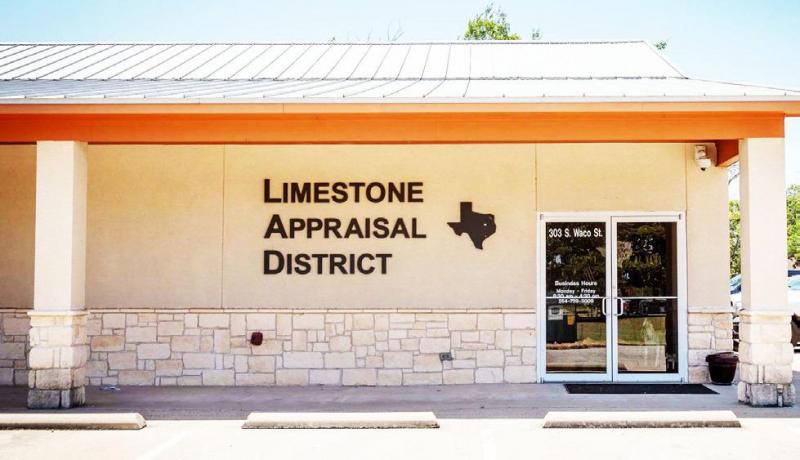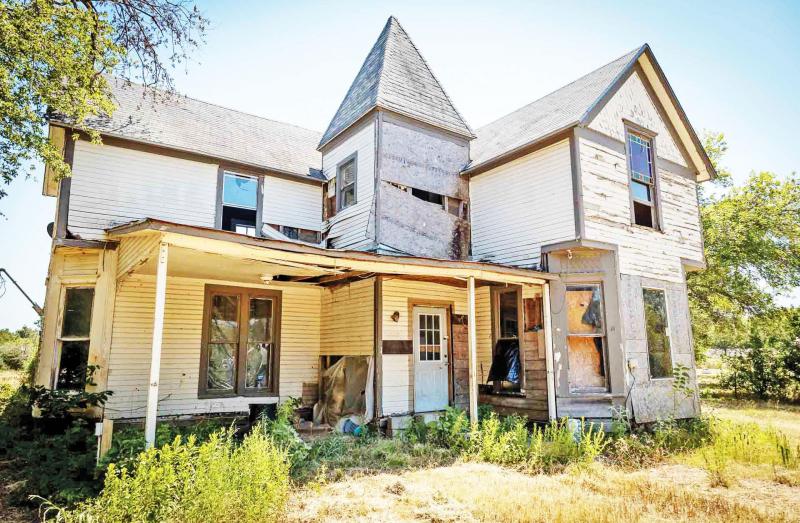Limestone County Appraisals Go Haywire as Dilapidated Homes See Stark Value Increase
A ramshackle house on East Hopkins St. in Mexia sits on a lot overgrown with weeds and cascaded by rotting siding. This peeling structure is emblematic of the glitches that have wrought havoc on home values in the county and the entity tasked with assessing them — havoc that includes a canceled contract and the chief appraiser’s resignation.The building in question saw its value increase from $48,190 in 2022 to $82,930 in 2023, increasing 72 percent in a town east of Waco whose population has decreased every year since 2010. The structure looks like it hasn’t been repaired in a halfcentury, let alone in the last year.
The value of the property did not change, just the structure — a structure that is quite literally falling apart.
This was discovered by Limestone County resident Carl Haddick, who began inspecting property values after his own home’s value rose 90 percent; his rental house increased by 215 percent.
The small, modest home next door increased 122 percent.
Jana Raymond, a Groesbeck resident, saw the value of her home increase from $415,500 to $923,650.
While many homesteads increased in value, the building in which the Limestone County Appraisal District (LCAD) operates — which sits in Groesbeck, not Mexia — remained level. Other commercial properties on its block, such as the Texas Farm Bureau office and the Justice of the Peace headquarters, rose by less than 2 percent.
But the one homestead on its block — a 1,288 squarefoot home in poor aesthetic condition — increased in value by 87 percent.
The drastic variation in appraisals has wrought havoc on the entity in charge and led to a major shake-up.
When contacted by The Texan, an LCAD employee said nobody was available to answer questions and that it wasn’t known when someone would be available. When asked for a way to contact the Appraisal Review Board (ARB), the employee refused to provide any phone number or email address.
But The Texan can confirm that LCAD’s chief appraiser, Terri Lenamon, resigned after a called ARB hearing on June 30 set to examine the valuation issues. That position remains open.
That meeting also resulted in the cancellation of a contract with Western Valuation and Consulting, a firm that specializes in appraisals.
Richard Petree, a partner with Western Valuation, told The Texan that many poor-condition houses saw such large value increases because of a software glitch.
LCAD uses assessment software called Orion from Tyler Technologies. But the software was not taking into account the condition factor when projecting the valuation — meaning that the run-down condition of the Hopkins St. house did not play a factor in the estimated value as it did in years past.
“The whole process really went south,” Petree said. Other CADs such as Williamson and Lubbock Counties that use the software haven’t had any issue with the software, Petree added, because they have their own IT departments.
Limestone County is far smaller than those two.
Western Valuation’s contract with LCAD amounted to $140,000 annually through July 2025. The company was tasked with “assist[ing] the district in making appraisals of all taxable property, including land and improvements thereon.”
Petree said that based on his analysis, much of the property in LCAD’s jurisdiction was valued at 70 percent of the selling prices, drastically undershooting the market value; the state’s school finance system requires CADs’ valuations to fall between 95 and 105 percent of the Texas Comptroller of Public Accounts’ judgment in its ratio study.
If a school district’s rolls fall outside of that range, the amount of money collected and received through the state’s recapture program changes.
When he heard of the ARB meeting, ostensibly with the intention of canceling Western Valuation’s contract, Petree penned a memo to the board explaining the problem and making recommendations to fix it.
Those recommendations were to: Correct valuation errors where they exist in concert with taxpayers who protested the values Fix the software and reduce valuations of houses in “poor” and “fair” condition even if there was no protest Verify the condition class of all homes at the lower end of the scale Petree then said that in an effort to have appraisals match sale prices, past LCAD employees goosed the values by moving homes into higher condition classes — which came after they previously did not adjust the value of unsold properties to reflect the sale prices of comparable property.
“This violates the ‘equal and uniform’ standards of law and the state constitution,” Petree wrote to the board.
Overall, he said that through the years, the gap between comparable sale prices and the CAD’s appraised value had widened; the broad appraisal increases illustrate the attempt to close that gap.
“This process has not been without error, but the people who work directly for you and your contractors are ethical people trying to do the best job we can within the significant restraints on all of us by past actions of employees and faulty computer software,” Petree wrote in the memo, appealing to the ARB to let Western Valuation fix the problems.
The ARB canceled the contract despite the appeal, leaving LCAD holding the bag of a warped valuation environment without its previous consultant there to share the burden of righting the ship.
Petree told The Texan, “If the board would have followed our recommendations, we would have gotten the problem resolved this year.”
And for property owners, the mess has caused a public outcry.
Raymond was able to settle out of court, getting $466,000 of the appraisal knocked off her home’s assessed value. But the drastic increases led to a higher-than-typical number of protests. To assuage those concerns, according to Raymond, the ARB began acquiescing with the property owners and approving whatever value they asked for.
To make matters worse — according to Haddick, who relayed what an LCAD employee told him — the district lost all evidence for the 2023 tax year. When protesting, the entity is required to provide a packet of evidence for its valuation if requested by the taxpayer.
When Haddick’s protest hearing occurred, no evidence packet was presented.
These market value increases are not just ethereal factors; they affect real money coming out of real people’s wallets. On the one hand, a higher market value means a larger amount of money a homeowner can get for their property. But that only helps those who are looking to sell — and it only applies if someone is willing to pay that price, regardless of what the appraisal district estimates.
The prospective buyer sets the true market value, not the appraisal district.
But for those not looking to sell, higher market value means more money paid in property taxes. Homeowners in Texas with a homestead exemption are blessed with a two-pronged restriction on property tax bills — a 10 percent annual cap on the taxable value of their property and, for now, a $40,000 exemption.
The Texas Legislature recently passed a $13 billion property tax cut on top of school tax cut reforms already in place from previous years — a measure that includes a homestead exemption increase to $100,000 and more rate compression. Voters must approve the homestead exemption on the November ballot, which is likely to pass overwhelmingly.
Homestead exemptions provide direct and immediate relief but are vulnerable to the phenomenon known as “appraisal creep,” the methodical increase in property values that slowly eats away at that exemption.
If a home’s taxable value hits the 10 percent increase cap every year — something not uncommon in the booming Texas housing market — then in 10 years that exemption will be entirely washed away. It can be made even worse when accounting for the thing that actually increases tax bills: the rates.
Taxing units and their elected officials such as school districts, cities, and counties often like to point the finger at appraisal districts for rising tax bills. But it’s the taxing units that determine how much property tax bills go up, go down, or stay flat; the rates are set with full knowledge of the appraisal rolls certified by the CADs.
Non-homestead properties have neither an exemption nor a taxable value cap. For years, and especially in recent ones with a chaotic market, values on commercial and rental properties have increased substantially with zero limitations — and a commensurate increase in tax bills.
With the new law, those properties valued under $5 million will have a 20 percent cap, though it begins in 2024 and, for now, expires at the end of 2026. The Legislature also passed a provision that requires three ARB members to be elected by voters, not just appointed by the CAD’s board of directors.
Lawmakers intend the measure to make the CAD more responsive to the public.
The LCAD situation is a lamentable one, but it’s part of a larger appraisal system problem in the state. Recently, the City of Corsicana rejected the Navarro County Appraisal District’s budget increase request out of, in part, protest to displeasure with the district’s valuations.
Texas is in a state of flux with its rapidly increasing population, which brings more housing and commercial demand and development. More demand means higher market values of property, sometimes to an alarming degree for the decadeslong inhabitants of a home. And that stress is felt more acutely by taxpayers due to local governments’ heavy reliance on property taxes.
When a crumbling house nearly doubles in value, something has gone haywire — and the fallout from that structure has extended well beyond its termite-infested floorboards.


